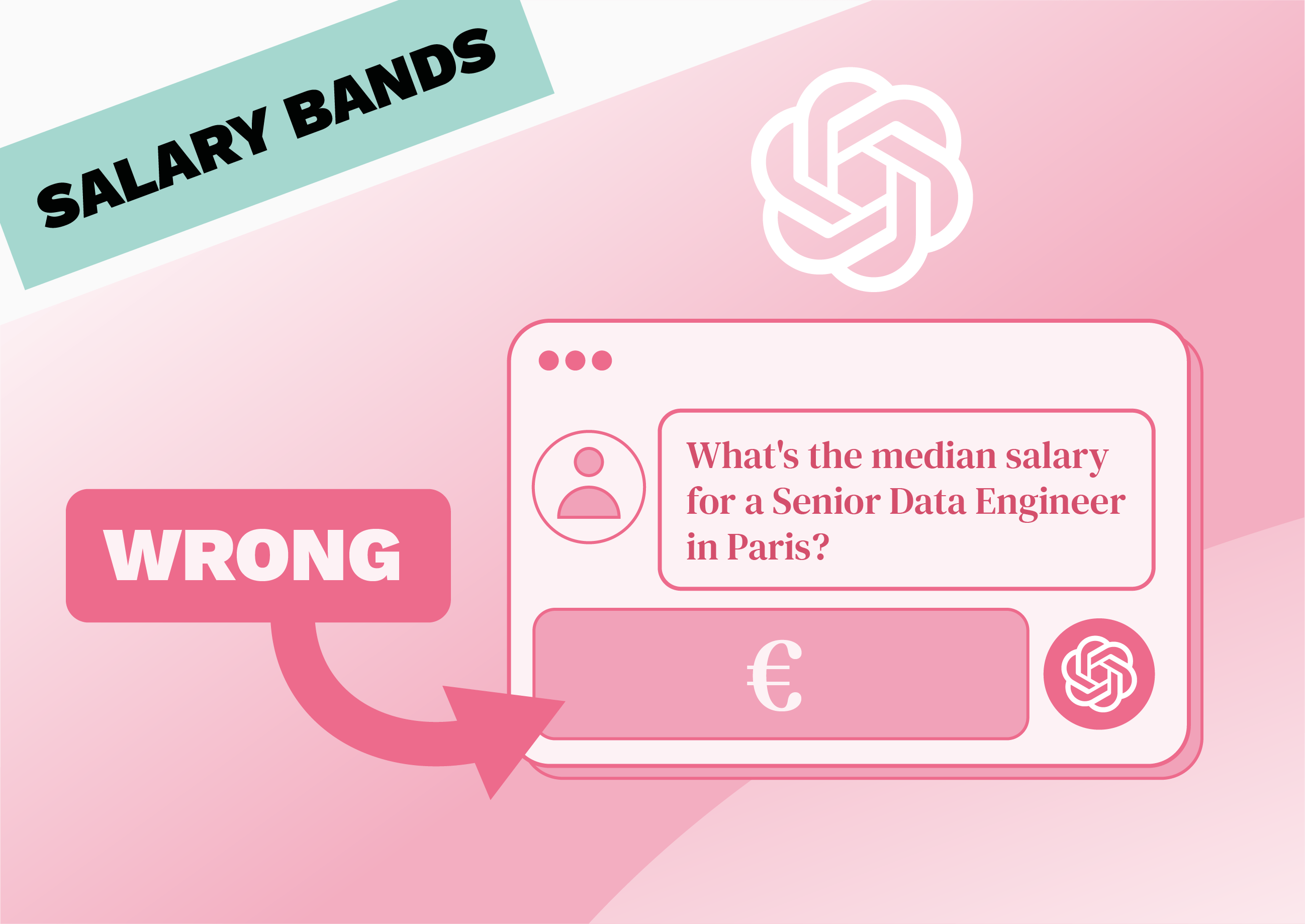Reading HR Textbooks on the Beach with Hatty Choudhury
We’ve recently been chatting with HR and people leaders to hear their thoughts on the world of HR and compensation. And we were super stoked to catch up with our recent guest, Hatty Choudhury.
At 28, Hatty is one of the youngest leaders we’ve interviewed for this series. And it’s taken him just a few short years to go from a lowly HR administrator role to his current position as People Operations Partner at Olio.
Among other things, we talked about:
- Getting hired in a tough market
- How data is everything in HR
- Handling compensation in a startup environment
- Viewing pay transparency as a spectrum
- What the future of HR looks like
An(other) accidental HR leader
If there’s one theme emerging from our interview series, it’s that many HR leaders don’t set out to become HR leaders. A finance graduate, Hatty originally got started in HR after struggling to find a role in his chosen field — but has no regrets.
“Fast-forward to today, I’m still here doing what I do just because I love that HR is a place where your focus is on people,” he told us. “I like understanding people and contributing to making their lives happier. That really matches the kind of person I am.”
Hatty also enjoys the diversity that a career in HR can offer:
“There are so many different approaches. If you move between jobs in HR, every time you’re under a different leader, you’ll see that they have such different viewpoints and directions. You can learn so much just from moving around from place to place.”
Growth from adversity: getting hired in a tough market
But it hasn’t been plain sailing for Hatty. Like many of us, he was heavily impacted by COVID-19, when he struggled to find work after being laid off by his previous employer, Ocado.
“I got to see firsthand how hard it is to find a job in a scarce market,” he told us. “I was unemployed for eight months, and in that time I did over 50 job interviews. Probably closer to a hundred.”
Then an HR administrator, it wasn’t that Hatty struggled to find suitable roles — but that the economic conditions were just as difficult for everyone.
“Due to the state of the job market, I had HR directors applying for the same roles because they couldn’t find any other jobs. It was such a tough market.”
Instead of giving up, though, Hatty used this time to improve his knowledge and expertise in HR.
“It really was a wake-up call to me to realise that simply relying on job experience won’t get me anywhere in the world — I really have to be a step beyond that,” he told us.
“I bought book after book about things to do with HR, or being a good manager, or remote working. I read article after article, just learning everything I could about the industry. It really changed me into a different kind of person.”
Eventually, Hatty’s efforts paid off — but this desire to learn more is something that stays with him to this day.
“I finally started to ace those interviews after those long eight months, and I landed my next job,” he told us. “But that part of me that was so desperate to grow still lives on in me. That’s what’s excelling my career so quickly.”
Challenges of compensation in the startup universe
These days, Hatty is People Operations Partner at Olio, a startup in the environmental services space. And we got to chatting about some of the challenges of handling compensation in the startup world in particular.
“It’s really tricky, because the business itself isn’t always completely sure what it needs. So things like job descriptions often don’t match the jobs that people are actually doing. Six, twelve months down the line, someone might be performing a completely different role to what they were doing when they first joined.”
Transparency as a gradient, not all-or-nothing
Of course, one of the big topics we like to ask our HR experts about is pay transparency. And we’re always interested to learn about the different things it can mean for each organisation.
Olio, for example, is not in favour of full salary transparency, because they believe it can influence the way employees think about their colleagues and peers. But according to Hatty, transparency is a spectrum, not a black-and-white issue:
“You have to ask yourself, ‘What are you trying to achieve with full salary transparency, and is it the most effective way to get what you want?’”.
One thing that Olio is passionate about is transparency on the ratio between the highest and lowest-paid employees.
“We have the idea that the highest-paid person in the business should never get paid more than ten times as much as the lowest salary. That’s a benchmark we’ve created to make sure that the ratio never spreads apart too much.”
Data, data and more data
To Hatty, almost everything in HR comes down to data. And learning to properly understand and analyse it is one of the most important skills for a budding HR pro. We got to talking about a few of the different ways that Hatty goes deep on data in his role at Olio.
1. Going beyond the gender pay gap
We’re all talking about the gender pay gap right now. But Hatty believes that most companies aren’t going far enough with their analysis.
“I’m not just looking at the gender pay gap as a whole. I’m looking at it across things like age ranges, different departments, and then even at different levels of seniority, broken down as much as possible,” he explained.
“I categorise that into so many different viewpoints, and then you get a whole bunch of different data that you can work with to look at it from different perspectives.”
2. An unlimited leave policy that (really) works
Another thing that Olio handles particularly well is its unlimited leave policy — and according to Hatty, that’s all down to data too.
“It’s not just about having an ambitious idea — we made it work because we have so much data and research,” he told us. “For example, I looked at all of the different ways that people take leave, and all of the different types of leave that they take, how much support they need, and how often it's needed.”
“These are all data-backed answers and strategies that we’ve created. That’s how we’ve managed to take an ambitious idea like unlimited annual leave and make it into something that has a lot of moving wheels but works very structurally.”
DEI: not a one-and-done situation
Diversity, equity and inclusion is another topic that’s on the minds of most HR leaders these days. Hatty told us that the biggest part of HR’s role in this area is educating other employees — and even the organisation’s leadership — on what DEI really means.
“People see it as this single, one-time value to work towards. Again, they see it like a binary: you’re either diverse or you’re not — which is completely incorrect.”
For example, picture an organisation that’s doing well on its diversity stats when it comes to race and gender, but only hiring candidates over 40 years old.
“Suddenly, that perspective of diversity will shift again,” Hatty said.
In other words, diversity is not something that can simply be checked off your list — it’s a constant work in progress.
Looking to the future of HR
As well as talking about what’s going on in the world of HR now, we always like to ask our guests what big topics they think that will come up over the next few years. Here are a few of the things that Hatty had to tell us.
The ‘Big Short’ in tech salaries
The last few years have been nothing short of tumultuous in the tech talent world. And according to Hatty, something like a ‘Big Short’ is coming — if it’s not here already.
Here’s the problem, as Hatty explained it to us:
A few years ago, tech investment was huge, so giants like Google, Amazon and Meta had a lot of money to spend. And a lot of that went on tech talent, like software engineers. Because these companies have deep pockets, this created a two-tier system for tech salaries.
“Let’s say we take two software engineers,” Hatty explained, “They’re at the exact same skill level, exact same experience level. Now one of them might apply for Amazon, and the other for a Series B startup — let’s say Olio. What I’ve seen is that for two businesses like this, there’s almost a six-figure difference in salary for the exact same experience and skill level, which is insane.”
The big problem is that these large organisations have since had to make a lot of layoffs — and in many cases, those software engineers with bloated salaries were the first to go.
“That’s what I call the beginning of the current market crash,” Hatty said.
Now, these same engineers are looking for the same salaries they might have found with the tech giants — and not finding them. According to Hatty, this might get worse before it gets better.
“Businesses need to resolve their burn rates and start gaining investment again. And then salaries will start to normalise,” he said.
Experience over qualifications
One thing Hatty would like to see HR leaders talk more about is the importance of experience over qualifications in HR. Specifically, he thinks the industry as a whole could be less obsessed with CIPD qualifications (though he assures us he has nothing against the organisation).
“A lot of individuals feel like they can’t make it in HR without a CIPD qualification. And equally, there are a lot of people who have the qualification, but they’ve noticed little to no impact on their development.”
So if a CIPD diploma isn’t the answer to HR success, what is?
“I think experience in HR is key more than anything else,” Hatty said. “There’s nothing more concrete than solving problems first-hand, and effective HR strategies are always case-by-case no matter what business you’re in.”
Reading HR textbooks on the beach
Before the end of our call, Hatty shared a fun anecdote from a recent holiday, where he travelled for a month — but took his love of HR with him.
“I took an HR textbook with me. I was literally sitting there on the beach with a drink in my hand, reading my HR textbook. I got a lot of funny looks.”
Of course, this might not work for everyone — and we’re not saying you have to forgo your usual holiday read if you want to succeed in HR.
But this story does get close to summarising Hatty’s approach to HR and his career: never stop learning, growing, and developing your skills… even when you’re at the beach.






